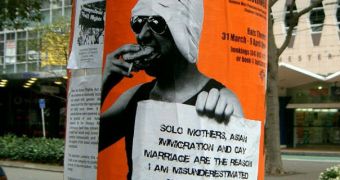According to a new scientific study conducted by criminologists at the University of Leicester, in the United Kingdom, the effects of hate crime are both more widespread and deeper than initially estimated in other scientific papers. The experts also distinguish between the most aggressive forms of such crimes, such as killings done by fanatics on members of another gender, age or religious group, and the lower level harassment, which is perpetrated by people who do not “hate” members of other groups per se. The team also argues that the latter type of hate crime is the most dangerous.
The new paper shows that the gap between the two forms of hate crime contributes to the propagation of this dangerous state of affairs. While the most extreme cases get media attention, and are brought to the attention of the general public, the lesser forms almost always go unreported.
This has far-reaching consequences for the victims, their families, and even broader communities, and was identified as being one of the factors that misled psychologists in their analyses of certain events. While, on the surface, everything seems clear, some cases can only be solved when looking at this type of stereotypical and discriminatory background.
“We would argue that hate crimes are acts of prejudice towards an individual's perceived identity. They are often believed to be 'message crimes' designed to intimidate the victim's wider minority community. However, contrary to popular opinion, these crimes are not always carried out by right-wing political extremists,” University of Leicester Department of Criminology expert Dr. Neil Chakraborti, one of the leaders of the new research, says. The other leader was Mr. Jon Garland, also from the ULDC.
“It is common for these crimes to be committed by 'ordinary' members of the public whose prejudices may have been reinforced by the mainstreaming of far-right ideology, such as the 'British jobs for British workers' slogan. It is also important to realize that it is not just minority ethnic or faith communities who are targeted – victims include gay and transgender communities as well as the disabled,” the expert adds.
“What the research suggests is that we need a deeper understanding of what hate crimes actually are, their impact on the victim, who carried them out and, crucially, how they are dealt with by the criminal justice system. There is some evidence that the policing of hate crimes has improved, with the police now prioritizing the investigation of such crimes,” Garland says, quoted by AlphaGalileo.
“Relations between the police and minority communities are still problematic, though, and this is one of the main reasons that the majority of hate crimes are not reported to the police. This lack of reporting makes it difficult to accurately ascertain the exact level of these crimes. What we can say is that, from our research, it appears that current levels of hate crime are having devastating effects upon victims,” he concludes.

 14 DAY TRIAL //
14 DAY TRIAL //